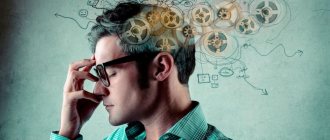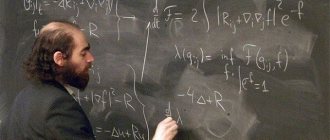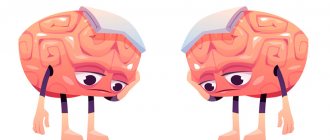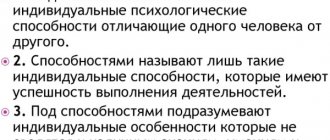Where to begin
Brain, mind, intelligence, intellect, consciousness and the unconscious - what unites these meanings and what is their fundamental difference? Each person has his own subjective understanding of the meaning of these words. I have long been interested in how they are similar and how they are different, what follows from what and what interacts with what. At first glance, these terms are largely similar in meaning, but in fact, I want to divide them into two completely different groups.
When I decided to write this article, I had some idea of what I would write about. And yet, before starting, I looked at information about this in various sources. I also used a translator to check if there was a difference in the meanings of these words in the English version. This didn't give me any results. During translation, many meanings overlapped with each other. For example, “mind” means mind and intelligence, attention and even soul in a certain context. As for explanatory dictionaries, in some of them the author’s interpretation agreed with my opinion, and in others it was absolutely opposed. Having collected all the information and my personal understanding together, I took the risk of sharing with you what I ended up with. Let's understand these concepts together.
An example of the Russian intelligentsia
I have always been alarmed by the savagery of the Russian intelligentsia in matters of the political life of the state. Often “intellectuals” simply criticize everything around them, call the people cattle, but at the same time they do not offer anything of their own that would work better than the current system.
When their positions win, something terrible begins to happen in the country. Universal freedom immediately turns into slavery and poverty, everything around falls apart.
Because these are intellectuals who should not be concerned with political issues at all. They have no plan, no long-term thinking. There is only disagreement, protest, which is not supported by reasonable proposals.
Mind and Intelligence
Consciousness, mind, intellect and reason are by their nature parts of the human thinking apparatus, but they only perform their functions in different ways. Mind and intelligence are close concepts to each other. They have certain differences, but very often their functions overlap. By differences I mean:
The mind is the accumulated experience and knowledge base. Where and how to act, depending on how familiar and “correct” it is.
Intelligence is a way of thinking, a test of improvisation. For example, how to get out of a situation in which you have never been and do not have sufficient knowledge and experience in this area. Despite these differences, their basic functions are similar. The level of intelligence determines the mental ability of an individual. This is clearly seen from the fact that at the beginning of the 20th century, scientists proposed to determine the degree of mental giftedness using specialized tests (IQ test, intelligence tests). Many people know and have passed similar tests. The test result to some extent shows whether a person is “smart” or “fool”. Although these tests have a lot of shortcomings and lack of consideration of many important factors such as: the individual’s logical or creative thinking, the degree of preliminary preparedness for this type of task. All this allows the test to make a bunch of errors as a result. But more about this some other time. Now let's return to our topic and continue to analyze the terms “mind” and “intelligence”. For the purposes of this article, I will combine them into one similar definition since we will mainly compare them with the concept of “mind”.
I found this terminology regarding intelligence in the Psychological Dictionary:
“In modern Western psychology, the most common understanding of intelligence is as a biopsychic adaptation to the current circumstances of life (V. Stern, J. Piaget, etc.)”
This reminded me of how at one of the seminars S.V. Kovalev defined the mind as a part of the thinking apparatus that is responsible for biosurvival processes. Such as satisfying your basic needs: preserving life, procreation, finding food and shelter, etc. In principle, everything that is inherent in living organisms (animals). In the modern world, with all the amenities and relative safety, with the ability to get food, sometimes without leaving home, the need for the mind has sharply decreased and it has stopped evolving. Therefore, if a person continues to live only in his mind, without connecting his mind, then he degrades. Metaphorically speaking, “he goes up the stairs leading down.”
Structure
The processes in our head are so complex and diverse that they are not subject to structuring according to several criteria. Comparing a talented mathematician with a brilliant composer is difficult and unproductive.
Psychologist Daria Milai
Make an appointment
J.P. Guilford presented a three-dimensional cubic model in which he identified 120 mental abilities (memory, analysis, assessment, expression of thoughts, etc.) and structured them into three components:
- Content (what we think about).
- Operation (as we think).
- Result (what the process leads to).
Some people are able to quickly draw conclusions and make decisions, others are close to flashes of insight with an instant understanding of the essence (remember Archimedes with his “eureka”), others are fixated on the assumption that came first. An intellectually developed person can live happily all his life, while thinking haphazardly and impulsively, without going beyond standards and stereotypes.
Your Majesty Reason
In contrast to the mind stands Reason. I would like to write it with a capital letter so as not to confuse it with that mind, which in definitions is often considered synonymous with intelligence. Everything is very subtle.
Reason is based on intuition and is associated with knowledge and with the wisdom of the universe. It can develop indefinitely. Reason is inherent in every person, and awakens and develops only in solving problems not related to biosurvival. Such tasks include creativity, self-actualization, and development of one’s self. Everything without which you will not feel special, chosen, aware of what this world is for you and what you are for this world, and for yourself. Without which you are just a bag of skin with organs and bones and endless desires to eat, buy, hang out, lie on the sofa and everything like that.
As it is believed among scientists, only humans have intelligence; animals do not have it (although species such as dolphins most likely have it).
“Reason, the highest level of human cognitive activity, the ability to think logically, comprehending the Meaning and connection of phenomena, to understand the laws of development of the world, society and consciously find appropriate ways to transform them.” Extract from Ushakov's explanatory dictionary.
Much is very similar to my understanding, except for “thinking logically” and “consciously finding”. Still, Reason, unlike the mind, is based on unconscious processes and is rather not logical, but intuitive.
Concept
From Latin this word is translated as understanding, knowledge. Intelligence is the ability of our brain to understand and solve certain problems.
Plato was the first to raise the idea of the cult of intellect. In all his texts he attached great importance to thinking. He wrote that life without curiosity, the desire to learn new things, is impossible. Plato was fully supported by his student Aristotle, who developed the concept of the primacy of reason. He said that the one who has the inclination to rule should rule, and others should obey.
The level of mental abilities can be developed and increased, or it can be decreased. Academician Moiseev states that intelligence is the creation of a successful strategy, planning your steps, which will help you achieve your desired goal. This is the organization of one’s life and activities with the help of other abilities, which include: learning, thinking, the ability to classify, integrate, isolate unnecessary things, find connections and patterns.
The main properties of intelligence are:
curiosity - the desire to learn something new, to explore phenomena; depth of mind - the ability to find the main and important things in a pile of information, and weed out the unnecessary; logic - consistency of reasoning, the ability to build reasonable and correct chains, taking into account relationships and details; mental flexibility - a person’s ability to use his capabilities, experience, knowledge, without using templates, but creating his own solutions to problems; breadth of thinking - the ability to fully study data, not lose information, see several solutions to a problem; critical thinking - the ability to evaluate the result of work, find the right ones and weed out the false ones, also the ability to change the path if it is not the true one; evidence of the mind is to find facts and use them at the right moment to make sure that the goal is correct.
In ordinary life, an individual always uses his thinking abilities to understand the world around him, take next steps and find the optimal solution. It is quite difficult to imagine even a day of life without the ability to analyze the situation and compare facts and objects.
Only through the thought process is there the possibility of self-development and personal improvement. Without intelligence, a person would not be able to make scientific breakthroughs, create cures for dangerous diseases, create music, or paint pictures.
Information storage
If our consciousness is responsible for the mind and intellect, then the mind is the area of the unmanifested reality of the unconscious world (Fig. 1).
Rice. 1. Location and distribution of mind, intellect and intelligence
Man as a cosmic being is connected to two information repositories. One is our ordinary human brain, and the second is the giant brain of the universe. It is called by different names: collective unconscious, cosmic mind, Akashic Chronicles, etc. So, our first physical brain regulates the processes of mental activity, intellect, memory, consciousness, and the brain of the universe regulates and fills our Mind with information. Just imagine what a colossal experience this is of entire generations and civilizations, accumulated in this universal library. And all this knowledge is available to us if we learn how to obtain and use it correctly.
Rational thinking
Life does not stand still, it is constantly changing, in order to keep up with the times, you need to be able to adapt to new conditions. A smart person will not invent something new if there is no reason for it. He is able to show flexibility of thinking and rationality, and find another, simpler and more optimal way to solve a problem.
You need to be able to look at a problem from different angles, look for more than one solution, but have several backup options. A highly intelligent person can be critical of his decisions and thoughts, and be able to admit his own imperfections and mistakes.
He does not consider himself superior or smarter than others; he is able to adequately assess his own knowledge. Self-improvement and a thirst for knowledge will help you make yourself better. A person with high intelligence never stops there; he always strives for improvement.
Your opinion is important to me
I do not pretend that the written interpretation of such broad concepts as mind and reason in this article was perceived as the only correct one, since I understand that there are other points of view on this matter, that this topic affects deep understandings and can cause discussion and possible disagreement, and a completely different awareness of their meaning. It’s not like you can sort apples and pears, but everything is much more complicated. I encountered huge differences in the interpretation of the meaning of these words when I was preparing to write this article and re-read the interpretation of the terms in various dictionaries and reference books. My goal is to understand the true meaning of everything that surrounds and what is inside us. I am collecting pieces of it bit by bit for myself and for you. If the information in this article was useful to you and opened up a new understanding of important concepts and meanings, then I am absolutely happy. And yet, I would like to hear your opinion on this matter, which I will be happy to read in the reviews to this article.
Share link:
- Click to share on Twitter (Opens in new window)
- Click here to share content on Facebook. (Opens in a new window)
Liked this:
Like
Diagnostics
Intelligence studies are carried out on the basis of various methods and techniques. All of them are based on two principles: testing and experimentation. For example, logical thinking and pattern identification skills are revealed using Raven's progressive matrices. Amthauer tests specialize in orientation in professional activities. Both the first and second technologies are developed for people of different ages. To evaluate a child, the Goodenough-Harris method is suitable, which gives an assessment based on a child’s drawing. All these developments are decades old, they are unified and give average readings.
Ask a question
Recommendations for increasing the coefficient
5 practical tips for training your brain activity and increasing your IQ that you can use every day:
- Challenge your brain, solve math problems, learn foreign languages, learn to play a musical instrument.
- Talk to educated people. By having a conversation and understanding the way smart people think, you will benefit for yourself.
- Play computer games that require strategy development and train your reactions.
- Read books, it develops vocabulary and erudition.
- Play sports, lead a healthy lifestyle.
What factors influence a person's mental abilities?
The level of intelligence can vary significantly among different people. Among us there are intellectuals, slow-witted people, people with average abilities and those who are commonly called mentally retarded. But why are people so different mentally?
Various studies have shown that the formation of human mental abilities is influenced primarily by genetic factors. Upbringing, environmental influences and random external influences play a much smaller role.
However, the external environment also has a certain significance for the formation of intelligence. These are factors such as the standard of living of the family, the level of education of parents, the nature of upbringing, the availability of school education for children (in American studies, students from good urban schools turned out to be more intellectual than students from modest rural schools). Research has even established the influence of such individual factors as annual family income, the size of the house and its cost, the relationship between parents, etc.
The role of nutrition cannot be ruled out. The brain is a rather voracious structure, and a lack of nutrients can lead to a decrease in its ability to process information.










